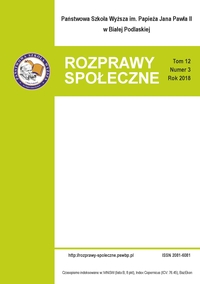Dogoterapia jako metoda wspomagania procesu rehabilitacji dzieci
Dog therapy as a method of supporting children’s rehabilitation process
Author(s): Sławomir ChrostSubject(s): Social Sciences, Neuropsychology
Published by: Państwowa Szkoła Wyższa im. Papieża Jana Pawła II w Białej Podlaskiej
Keywords: dog therapy; animal therapy; development and rehabilitation support
Summary/Abstract: Introduction. The author of the article presents, on the basis of research, the benefits of using dog therapy in supporting the development and rehabilitation of children. Material and methods. In the research conducted in Świętokrzyskie Province, the method of individual cases was applied, the interview technique was employed with interviews given by seven people (two therapists and seven parents), who described cases of seven children participating in dog therapy. Children (Kamila, Karolina, Karol, Bartek, Mateusz, Sylwia, and Miłosz) were in the age group of 6-11 years. Each of them manifested difficulties in normal development or were affected by disability. Results. The research showed that the main benefit of applying dog therapy is a definite improvement in various spheres: the social sphere (interpersonal contacts), self-esteem (development of boldness and courage), the sensorimotor sphere (speaking, reading, walking, controlling emotions), motivation to take action or to develop a sense of responsibility. Conclusions. The collected research material demonstrates that the presence of a dog in the classroom allows the child to relax and calm down. It also lowers the level of anxiety and shapes a lasting bond. It should be noted that patients with open wounds on the body, allergic to dog’s fur, having obsessive fear of animals, aggressive ones, patients having mental disorders or ADHD, cannot be referred for dog therapy activities. For these reasons, choosing dog therapy as a method of rehabilitation should be previously confirmed by appropriate information on the patient’s mental health, the level of their aggression and other undesirable traits.
Journal: Rozprawy Społeczne
- Issue Year: 12/2018
- Issue No: 3
- Page Range: 64-72
- Page Count: 9
- Language: Polish

